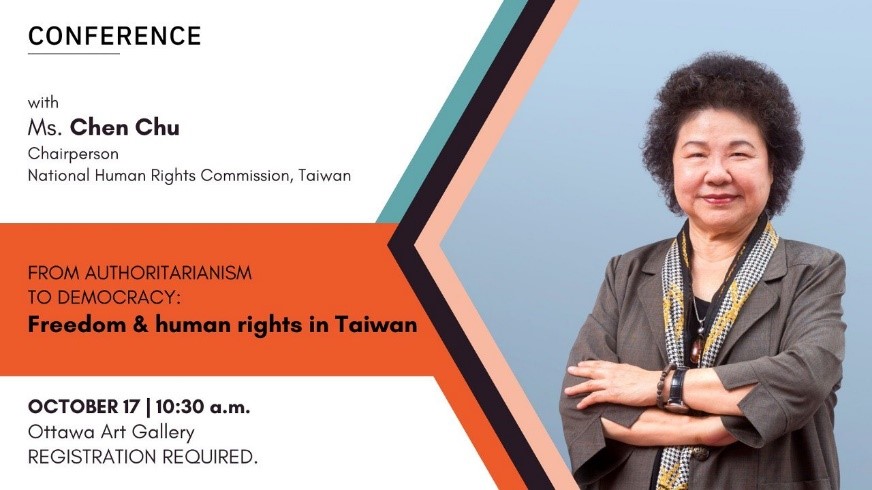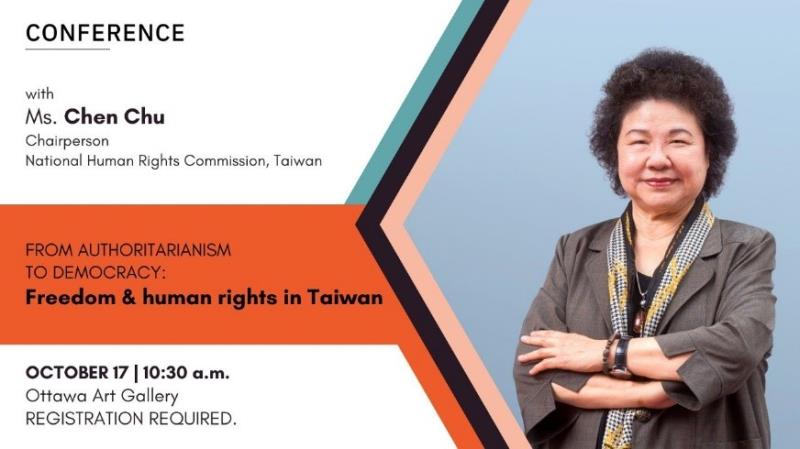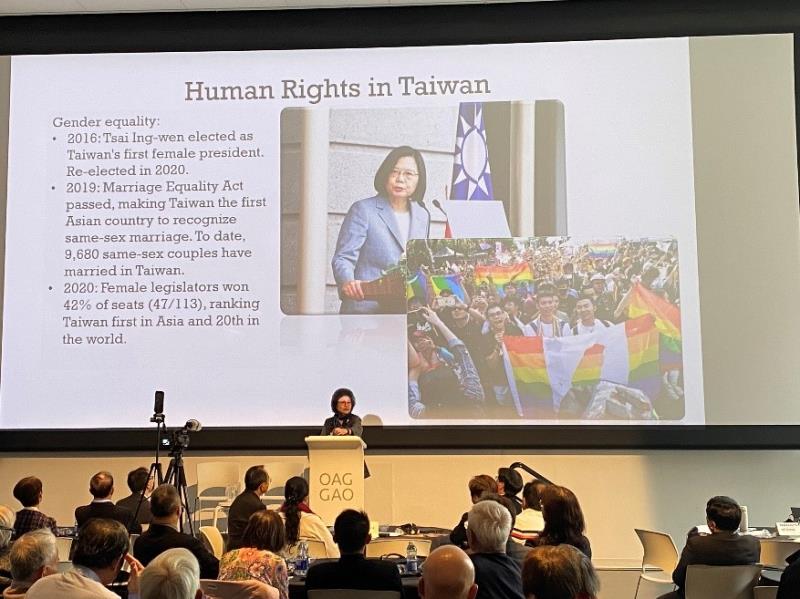Taiwan’s Top Human Rights Advocate Speaks in Ottawa on Taiwan’s Path to democracy

The Human Rights Research and Education Centre (HRREC) and the Research Chair in Taiwan Studies at the University of Ottawa worked with the Taipei Economic and Cultural Office in Canada to have Ms. Chen Chu, Chairperson of the National Human Rights Commission in Taiwan deliver a public presentation on Taiwan's path to democratization, on October 17, 2023. This event was very well attended by a diverse audience, including university faculty, students, Canadian government officials, journalists, Canadian democracy advocates, Canadians who have been supportive allies of Taiwan's democratic movement, and members of the Taiwanese community in the Montreal, Toronto and Ottawa areas.
In her presentation, Ms. Chen elaborated on Taiwan's challenging journey towards human rights, freedom, and democracy. She took the audience back to one of the most significant democracy advocacy events, the famous Kaohsiung Incident—also known as the Formosa Incident, or the Formosa Magazine incident—that occurred on December 10, 1979. Formosa Magazine organized more than 20,000 Kaohsiung people to demand Taiwan carry out reforms, implement democratic constitutionalism, and protect vulnerable groups, workers, and indigenous peoples to make Taiwan’s society freer and fairer. Protesters held marches and gave speeches, demanding an end to party bans and martial law. More than 100 people were arrested three days later, on December 13, and eight people—including Ms. Chen, who was then a member of the editorial board of Formosa Magazine—were tried in military courts.
She recounted how she was arrested and imprisoned.
“During the process, I felt an indescribable sense of loneliness, because I was facing death. Many of my dreams in life may not be fulfilled.”
At that time, Ms. Chen felt that she should share her true feelings with the people of Taiwan before she died, so she drafted her will secretly passed her “Last Note to the People of Taiwan” to her lawyer.
She also recounted how she was later released, in 1986 In the following year, 1987, Taiwan lifted martial law and embarked on the road to democracy, and Taiwan's opposition party, the Democratic Progressive Party was finally permitted to be formed. After the lifting of martial law, all the demands made during the Formosa Incident were implemented within a few decades. These included the election of Taiwan's Congress in 1991, the first direct election of Taiwan's president in 1996, and the first change of government to the opposition political party occurred for the first time in the 2000 presidential election.
“From then on, we can see social movements in Taiwan flourishing.”, said Ms. Chen.
She added with emotion: “Taiwan has faced decades of authoritarian ruling and international isolation. It was really difficult for us to break through various challenges.”
The Canadian Human Rights Commission was established in 1977. The establishment of such national human rights commissions reached somewhat of a peak between 1990 and 2009, but Taiwan’s National Human Rights Commission was established in 2020. Ms. Chen pointed out that Taiwan was forced to withdraw from the United Nations in 1971, but since 2009, Taiwan has integrated international human rights conventions into its domestic laws, incorporating international human rights norms. Taiwan has currently adopted the International Covenant on Civil and Political Rights (ICCPR), the International Covenant on Economic, Social and Cultural Rights (ICESCR), the United Nations Convention on the Rights of the Child (CRC), the Convention on the Elimination of All Forms of Discrimination against Women (CEDAW), and the Convention on the Rights of Persons with Disabilities (CRPD). In addition, Taiwan has adopted the local review model used for these international covenants and invites international human rights experts to Taiwan to review its implementation of human rights.
Ms. Chen hopes that Taiwan's National Human Rights Commission will be able to collaborate with more democratic countries on human rights issues, share experiences, and “meaningfully participate in international affairs, which is also a very important basic human right for Taiwan.” She emphasized that democracy should never be taken for granted. She told the audience wholeheartedly, “I am now 74 years old, and I have been on the journey to Taiwan democracy for more than fifty years. I hope that everyone, like me, will never give up on Taiwan, and we will continue to pursue freedom. Democracy is greatly precious and human rights are out most valuable.”


